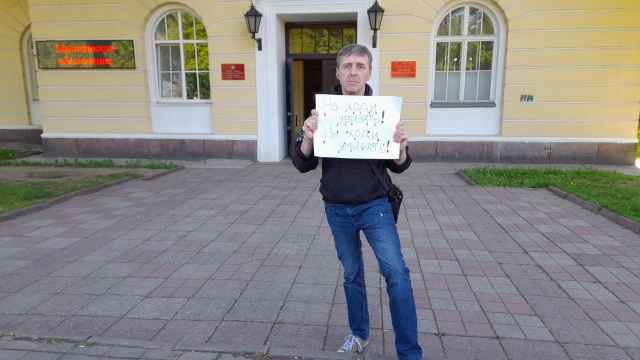Theater director Stepan Pekteyev has been fascinated with telescopes and microscopes since he was a child. He used to watch people walking by and peer into windows through his spyglass, curious to see what was usually off-limits.
This summer he joined with distinguished historical consultant Lev Lurye to satisfy his curiosity and share it with others. He created “Somnum” (“dream” in Latin), a theatrical production that takes place on the streets of St. Petersburg.
The audience first gears up for the performance, donning headphones and entrusted with their own spyglass. Then they head out into the streets, listening to the “voice of St. Petersburg” through their headphones. Sometimes there is a clamor of voices; sometimes just one telling stories about the city and its inhabitants or issuing instructions on wehre to focus the spyglass. And sometimes people from the real or literary past appear along their path.

The city in the mind’s eye
The Somnum narrator tempts the audience to relive or imagine events that once happened in the streets of St. Petersburg or were portrayed in Russian novels. From the bloody assassination of Tsar Alexander II on the Griboyedov Canal embankment — known as Catherine’s Canal at the time — in October 1883, to the last minutes in the life of Liza from Alexander Pushkin’s story “The Queen of Spades,” the city’s history and legends come alive.
As the audience moves through the city’s quiet walkways, canal paths and courtyards, they encounter a motley crew of characters from different eras. A teenage pie vendor boy treats them to some hot tea and a pie at the courtyard of the State Academic Cappella as they listen to the mouth-watering story of the glorious St. Petersburg’s bakeries and their street peddlers. One of those boys selling pastries was Prince Alexander Menshikov, one of Peter the Great’s closest friends — or so legend would have us believe.
Later the audience stops by the Winter Canal and witnesses the iconic scene from “The Queen of Spades” when Liza waits for Herman. It is near midnight, and he is nowhere in sight. Liza contemplates suicide – but thankfully, the audience does not see the tragic finale. Instead, they are encouraged to imagine an alternative ending, more farcical than dramatic.
That is one of the tricks — and delights— of Somnum. The production shows the audience just a part of “what happened,” a hint of what the situation might have been like. The full story is meant to evolve in the spectator’s mind’s eye. Each member of the audience adds their own emotions, characters and scenery to the movie in their mind’s eye.
So they don’t see Alexander II assassinated. They see a young lady waving a white handkerchief to signal the start of the attack. The lady was revolutionary activist Sofia Perovskaya, who co-engineered the plot. The handkerchief was a sign to Ignaty Grinevitsky to throw the bomb at the passing tsar.

The city through a different lens
During the performance, the audience members use the spyglasses to look at architectural details or try to read the emotions on the faces of the characters they meet. The idea is for these little pieces to make a whole portrait of St. Petersburg.
As Pekteyev told The Moscow Times, “I remember the first time I looked through a microscope in biology class. We were examining a piece of onion peel tinted with manganese,” he said. “Back then it seemed to me that those simple patterns were part of some grand design, and that the microscope, which you could turn to change the focus, gave us power over reality. That was an overwhelming feeling.”
Somnum is, in fact, about changing perspective – both visually and mentally. When standing on the charming Bolshoi Konyushenny bridge over the Moika River, most of us try to get a glimpse of the shining golden dome of St. Isaac’s Cathedral or watch a boat sailing romantically on the water below. But instead, the guide draws our attention to the green mansion at 35 Moika Embankment that once belonged to count Alexei Arakcheyev, a prominent Russian military commander. His name was synonymous with harsh and often completely groundless restrictions. His repressive and brutal means of dealing with his soldiers even received a name of its own, arakcheyevschina. This unflattering label is still in use in Russia, and the phenomenon, sadly, lives on. But is it possible to see Arakcheyev differently?
“This man has a far more complicated personality than his one-dimensional reputation suggests,” St. Petersburg historian Lev Lurye tells us in the audio guide. “True, he was unnecessarily brutal and cruel in punishing the soldiers, but it was Arakcheyev who prepared the Russian army for the Napoleonic wars. He could turn just about any group of street vagrants, gangsters and thugs into a combat-ready unit within just a couple of weeks.”
As St. Petersburg actress Yekaterina Reshetnikova, who attended Somnum as a spectator, told The Moscow Times, “We’re used to the idea that ‘theater’ is when we’re seated in a hall and watching a show. But here it’s very different. We need to switch on and fully engage our memory, our associations, our emotions,” she said. “In a sense, we’ve always been making our own films in our minds throughout our lives.”
For more information about the performances and ticket sales, see the site.
A Message from The Moscow Times:
Dear readers,
We are facing unprecedented challenges. Russia's Prosecutor General's Office has designated The Moscow Times as an "undesirable" organization, criminalizing our work and putting our staff at risk of prosecution. This follows our earlier unjust labeling as a "foreign agent."
These actions are direct attempts to silence independent journalism in Russia. The authorities claim our work "discredits the decisions of the Russian leadership." We see things differently: we strive to provide accurate, unbiased reporting on Russia.
We, the journalists of The Moscow Times, refuse to be silenced. But to continue our work, we need your help.
Your support, no matter how small, makes a world of difference. If you can, please support us monthly starting from just $2. It's quick to set up, and every contribution makes a significant impact.
By supporting The Moscow Times, you're defending open, independent journalism in the face of repression. Thank you for standing with us.
Remind me later.






